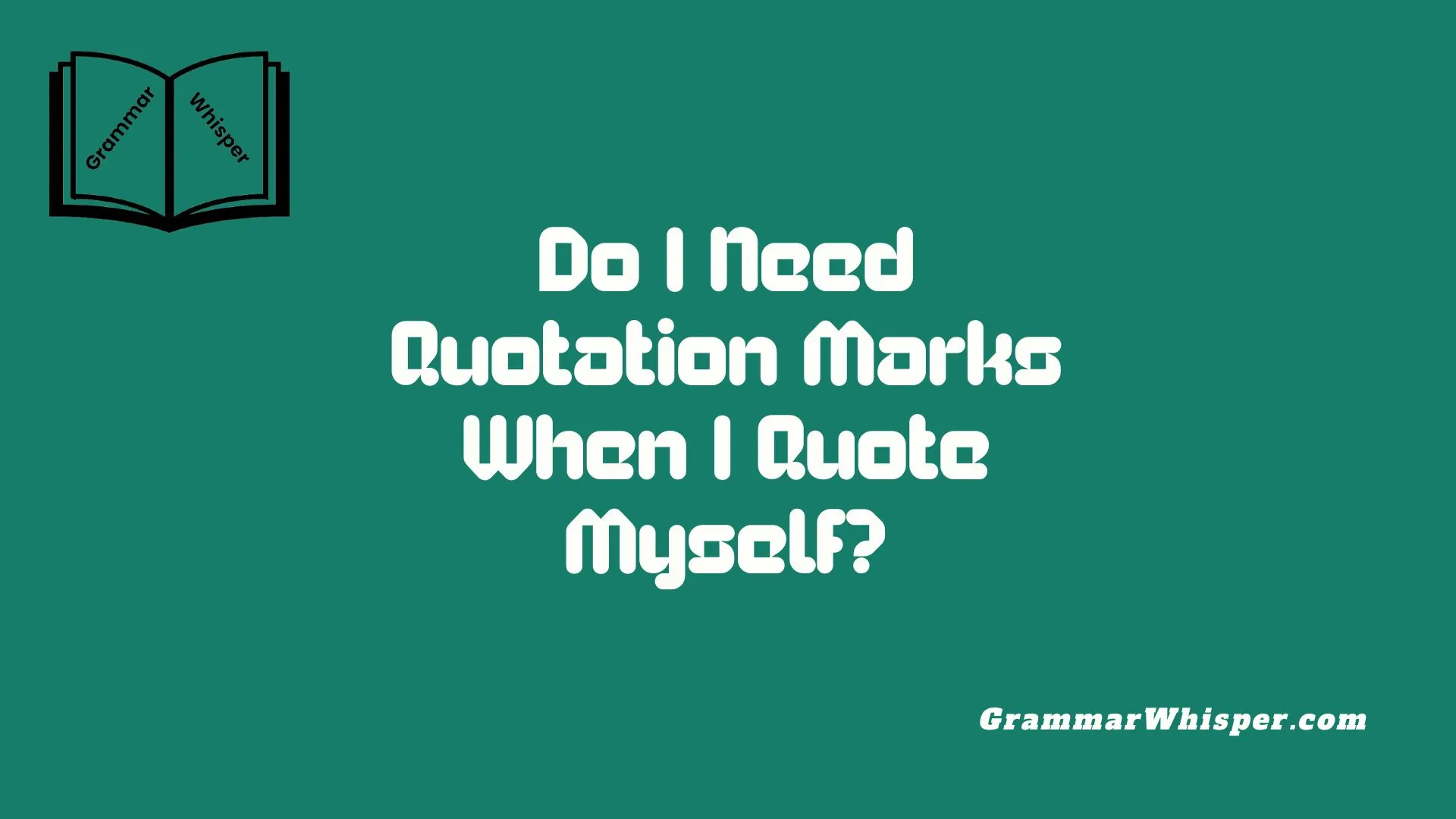As a writer, there are moments when bringing a past idea back to life gives your content fresh meaning. I’ve experienced this when Quotation Marks When I Quote Myself? in reflective essays, especially after gaining a new insight on a topic I thought I’d already covered. Whether you’re an academic referencing a published study or a blogger returning to a standout post, the key is knowing how and when to use quotation marks for clarity and impact. In one article I wrote, quoting a phrase from my earlier work felt strange – until I framed it right. That small shift transformed the tone of the piece, strengthening my communication and making the message far more powerful.
This leads to the real question – should you always place quotation marks when quoting yourself? Not necessarily. It depends on your role and the nature of your writing. In formal academic circles, it’s expected. But in digital storytelling, sometimes a paraphrased version works better. What matters is the context. Think of it as choosing the right angle for your audience. Follow a clear guide, and don’t be afraid to explore creative ways to show growth through your own words. Used thoughtfully, self-quotes do more than repeat; they reflect your evolving voice with more depth.
What Is Self-Quotation?
Self-quotation is when a person quotes something they’ve said or written in the past. This could appear in various forms:
- Repeating something from a prior book, article, or paper
- Referencing something you said in a meeting, interview, or speech
- Calling back to a sentence or idea earlier in the same piece
- Embedding your previous quotes into new content
Self-quotation can strengthen credibility, show consistency, or highlight personal growth. But it requires precision to avoid confusion – and that’s where quotation marks come in.
Do You Need Quotation Marks When You Quote Yourself?
The Simple Rule
Yes, you generally need quotation marks when:
- You’re directly repeating your past words
- You’re distinguishing a prior statement from your current narrative
- You’re citing yourself in formal, academic, or journalistic settings
No, quotation marks aren’t needed when:
- You paraphrase your previous ideas in a new voice
- You’re summarizing your own previous content without quoting verbatim
- The context makes it clear you’re referencing yourself
Examples
| Situation | Quotation Marks? | Example |
| Academic paper citing your past work | ✅ Yes | “In my 2022 study, I found that…” |
| Blog post paraphrasing earlier ideas | ❌ No | I wrote about this idea last year when I explored burnout and productivity. |
| Memoir quoting past journal entries | ✅ Yes | “I can’t do this anymore,” I wrote in my 2010 journal. |
| Marketing copy summarizing past campaigns | ❌ No | Our 2023 strategy focused heavily on organic reach. |
Self-Quotation in Academic and Professional Contexts
In formal writing, clarity and attribution are king. Quoting yourself without quotation marks can lead to ambiguity – or worse, the appearance of trying to pass off previous work as new.
When Quoting Yourself Requires Citation
In academic writing, self-quotation crosses into self-citation, especially when:
- You’re reusing content from a published paper or dissertation
- You’re referencing previous studies or findings you authored
- You’re expanding on a previously published theory or methodology
Style Guide Requirements
| Style Guide | Self-Quotation Guidelines | Quotation Mark Usage |
| APA | Cite your own past works as you would any other source | Use quotation marks for direct quotes from prior work |
| MLA | Cite previous publications with full references | Block quotes for long excerpts; quotation marks for shorter ones |
| Chicago | Cite self-authored content with publication details | Format like any external source with quotation marks as needed |
Example (APA 7):
According to Smith (2023), “burnout symptoms often mimic those of anxiety disorders” (p. 45).
Even though you’re quoting yourself, the same citation rules apply. Transparency matters.
Creative Writing & Literature: When Authors Quote Themselves
Writers often return to earlier ideas or borrow lines from their own work. In fiction or creative nonfiction, self-quotation becomes a literary device.
When It’s Used
- Repeating a character’s phrase across books
- Referencing a previously written poem or scene
- Embedding your voice from an older essay or diary
Use Quotation Marks To:
- Distinguish past writings or internal monologues
- Highlight character development
- Call back to earlier themes
“The truth,” she said, “always shows up late.” This line first appeared in the author’s 2001 novel, The Late Guest.
Pro Tip: Italics or block quotes can work instead of quotation marks for style variation, especially in creative formats.
Personal Essays & Blogging: How to Quote Yourself Naturally
Bloggers and essayists frequently reference their own past work. Here’s how to do it well:
When to Use Quotation Marks
- When quoting yourself verbatim
- When embedding a sentence or phrase you used elsewhere
When to Skip Them
- When paraphrasing your ideas or summarizing your older posts
- When referencing a general concept or topic you’ve covered
Example (Blog Context)
With Quotation Marks:
“I learned the hard way that multitasking kills focus,” I wrote last year, and I still stand by it.
Without Quotation Marks: Last year, I wrote about how multitasking reduces productivity – a lesson I keep relearning.
Best Practices
- Keep the tone conversational
- Avoid sounding like you’re quoting yourself for ego
- Link to the original post when possible
Quoting Yourself for Emphasis or Effect
Sometimes, quoting yourself is less about citation and more about punch. It’s a rhetorical move.
Situations Where It Works
- Reinforcing a key theme
- Highlighting personal growth or change
- Drawing contrast between past and present mindsets
Formatting Tips
- Use quotation marks to clearly separate past statements
- Use italics for emphasis if quoting yourself mid-paragraph
- Include dates or context for clarity
“This will never work,” I told myself in 2018. Fast forward five years – I couldn’t have been more wrong.
Digital Content: Quoting Yourself on Social Media and Websites
Self-quotation in digital formats is everywhere – from tweet threads to blog roundups to newsletters.
Tips for Using Self-Quotes Online
- Quote your best-performing tweets or captions for credibility
- Use pull quotes or image overlays for visual impact
- Embed actual tweets or links for social proof
Example (Instagram caption): “Create what you wish existed.” – Me, last week. Still true today.
Warning: Don’t Overdo It
Excessive self-quotation in digital content can feel narcissistic or recycled. Be selective. Make it meaningful.
Self-Citation in Research, Journalism, and Nonfiction
When you’re publishing nonfiction or investigative work, self-citation must follow industry standards.
Ethical Guidelines
- Disclose when referencing your own reporting or findings
- Avoid misleading the reader into thinking it’s new content
- Cite yourself with full clarity
Journalism Example: As I reported in my 2022 article for The Atlantic, “this issue has been brewing for over a decade.”
Legal and Ethical Considerations
You might think you can quote yourself however you like – but copyright law and publishing rights still apply.
Key Points
- If your work is under contract or published, you may not own exclusive rights
- Publishers might require permission to reuse material – even if it’s yours
- Always review terms of use before quoting content from co-authored or edited works
Copyright Reality Check
| Scenario | Can You Quote Yourself Freely? |
| Blog you wrote and self-host | ✅ Yes |
| Book published under exclusive rights | ❌ Not without permission |
| Academic paper published by a journal | ⚠️ Check publication agreement |
When in doubt – credit yourself just like you’d credit anyone else.
Common Mistakes When Quoting Yourself
Let’s clear up some pitfalls that even experienced writers fall into.
Avoid These Errors
- Misusing quotation marks: Don’t quote paraphrased ideas.
- Assuming copyright ownership: Know your publishing rights.
- Failing to cite past publications: Transparency is non-negotiable in academia.
- Quoting yourself out of context: This confuses readers and weakens your argument.
- Overusing self-quotes: Be selective. Make it count.
Best Practices for Quoting Yourself Effectively
Here’s a condensed checklist to follow:
✅ Use quotation marks for direct quotes ✅ Always cite published past works ✅ Use italics or formatting to enhance readability ✅ Clarify the date or source of the self-quote ✅ Use self-quotation to add insight – not ego ✅ Match the tone and voice of the current content
Real-Life Examples of Effective Self-Quotation
Brené Brown
In her books and talks, Brown often quotes her earlier research and TED Talks. She uses quotation marks and references to contextualize growth and reinforce consistency.
“Vulnerability is not winning or losing; it’s having the courage to show up.”
This quote, originally from her TEDx talk, appears throughout her writing – with proper context.
Seth Godin
In blog-to-book transitions, Godin often reuses powerful lines from previous blog posts. He rarely uses quotation marks unless lifting the sentence verbatim, often choosing italics or headings to distinguish.
Tools and Techniques to Manage Self-Quotation
Using technology wisely can simplify the process.
Useful Tools
- Zotero / EndNote: Great for academic reference tracking
- Notion / Obsidian: Perfect for content creators archiving ideas
- Grammarly / Hemingway Editor: Helps maintain clarity in tone when quoting yourself
Conclusion
So, do you need quotation marks when quoting yourself?
Yes – when you’re repeating your own words directly. No – when you’re paraphrasing, summarizing, or clearly contextualizing your ideas.
Ultimately, the goal is clarity, not cleverness. Your reader should always know when you’re speaking from the present or revisiting your past. Done right, self-quotation adds depth, credibility, and coherence.
Speak from experience. Quote yourself when it strengthens your message. And do it with confidence.
FAQs
Is it plagiarism to reuse my own writing?
If it was published elsewhere and you don’t cite it, yes – it’s called self-plagiarism.
Can I quote myself on social media without quotation marks?
Yes, especially in informal contexts, but clarity still matters.
Do all style guides require quotation marks for self-quotes?
Yes, for direct quotes. Each guide (APA, MLA, Chicago) also requires citations.
Should I quote my past blog posts in new ones?
Only if the quote adds value. Otherwise, paraphrase or link to the post.











